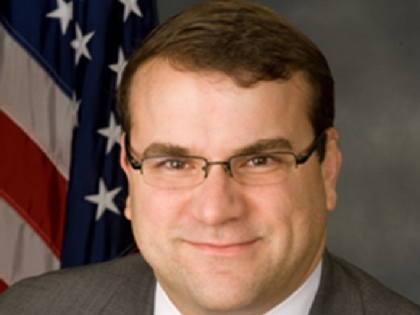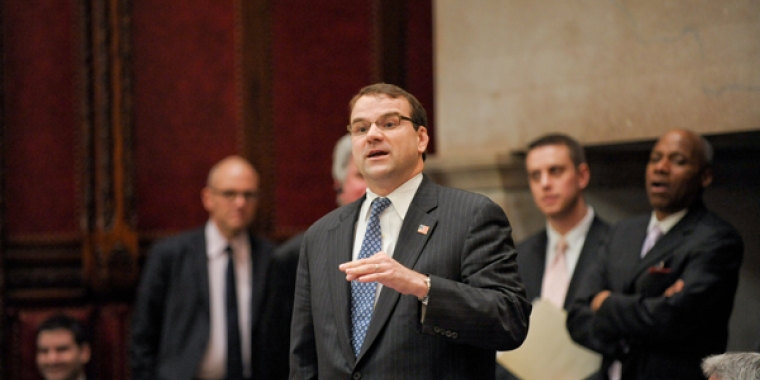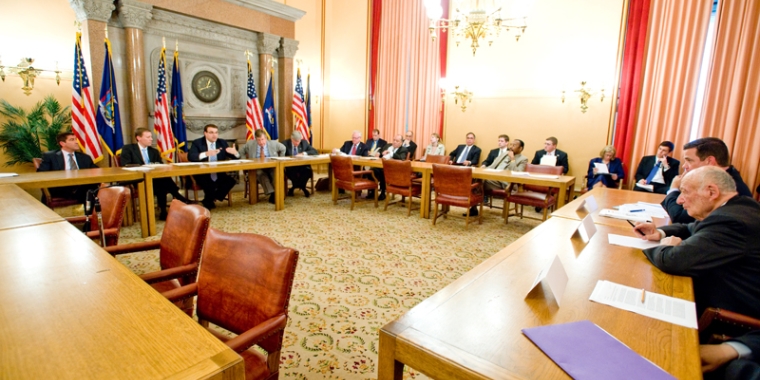
Senator Craig M. Johnson's Response To The Final Report Of The Commission On Local Government Efficiency And Competitiveness

April 30, 2008
Hon. Stan Lundine
Chairman
NYS Commission on Local Government Efficiency and Competitiveness
30 South Pearl Street
Albany, NY 12245
Dear Mr. Lundine:
I would first like to thank you for the opportunity to serve as a member of the NYS Commission on Local Government Efficiency and Competitiveness. It has been a pleasure working with you and the other members of the commission on some very serious issues facing New York State. Our discussions over the past few months have been important and many of the subjects we have tackled deserve real consideration and implementation.
That being said, I believe there are a number of serious flaws in the commission's final report which I cannot overlook.
First, this report does not to take into account the regional nature of government and services in New York State. In other words, this report fails to understand and address Long Island in ways in which we differ from the rest of the state. For example, the smallest town in Nassau County, the Town of North Hempstead, has a population of 222,611 as of the 2000 census while the largest Town in Nassau County, the Town of Hempstead, has a population of 755,924 and has the distinction of being the largest Town in the United States; there are three towns in Nassau County. In Cattaraugus County, located in southwestern New York, there are 32 towns, nine of which have a population of fewer than 1,000 people. The largest town, Allegany, has a population of 8,230 while the smallest town, Red House, has a population of 38 making it the least populous in New York State. There can be no doubt that local governments operate in a vastly different manner servicing such overwhelmingly different sized populations. Other than a brief focus on town takeover of commissioner run sanitation districts, this report makes little distinction between Nassau County and Cattaraugus County.
Second, there is almost no analysis of cost savings on any of the proposed consolidation initiatives. I have maintained since before the creation of this commission that no consolidation should take place without the taxpayers being made aware of how much they will save versus what loss in quality of services they will experience; in essence, there must be a cost-benefit analysis prior to moving forward. It has always been troublesome to me that the consolidation movement has been portrayed in a way that if a taxpayer pays $200 a year for library or water services, for example, consolidating this service into a larger entity, such as a town or county, would save that person $200 in taxes. This is simply untrue. That person would still be paying for the service through the larger entity; however it would be accounted for in a much bigger, less transparent fund. Also, there has been pie chart after pie chart detailing the average Long Island property tax bill which has shown over and over again that special districts alone make up less than 7 percent of the total bill. In fact, special districts, villages and towns combined make up approximately 20 percent of the total bill; it is widely known that school districts make up over 60 percent of the total property tax bill and I believe this is where the true war on property taxes must be waged – we must attack Albany’s insatiable penchant for unfunded mandates. That is why I co-sponsored and voted to move Senator David Valesky’s bill out of committee, S2201, which would have proposed an amendment to the State Constitution prohibiting unfunded mandates in most cases. I believe this is the direction we must go in order to truly tackle this ever growing problem and make a real positive difference in people’s lives.
This goes back to my original question: how much would taxpayers actually save? Without the answer to that simple question, I cannot justify wholesale consolidations, especially when many of these operations in my Senate District are cost effective and highly responsive to the residents they serve.
To do so, especially, without the consent of the taxpayers, would neither be responsible or prudent. I commend Comptroller Weitzman for providing a cost analysis for the town takeover of commissioner run sanitation districts in the Town of Hempstead, and I would urge this type of focus for all districts throughout New York State so that residents can make their own informed decisions about the future of their local governments.
I do believe this report contains a number of positive initiatives. I also believe that true reforms to the laws governing local governments are needed to provide relief to taxpayers by making our system more efficient and by curbing the abuses of the system that have shaken their trust. I intend to explore these remedies in my capacity as a State Senator. In fact, I have already introduced legislation, some of it hyper-local but still germane, which I believe goes hand in hand with the spirit of the commission:
S3758 which will clarify and stipulate that any property tax rebate received by volunteer firefighters or volunteer ambulance workers in New York State shall not be included as part of the firefighter/ambulance worker's adjusted gross income for personal income tax purposes. Volunteer firefighters and ambulance workers are often our first responders in many localities within New York State. The fact that these individuals, who so generously volunteer their time, often risking their lives in order to help others, have had to include within their gross income the property tax rebate offered by the state is unfair. These individuals receive no compensation for their valiant work. This exemption is the least we, in New York State, can do for our volunteers considering the cost to the state is virtually negligible;
S6069A which allows the Town of North Hempstead and the Village of North Hills to adopt resolutions to extend the boundaries of the Manhasset Lakeville Fire District to include any portion of the village that is not already within the District. If the extension is approved, the boundaries of the Fire District would match the existing boundaries of the Manhasset-Lakeville Water District, which is governed by the same board of commissioners as this is a joint fire / water district;
S7479A which will allow for villages, special districts, and local authorities to buy off of county contracts and off of contracts from other local governmental entities located within the same county. This would help local governments be more efficient in purchasing goods and services, as they would not have to unnecessarily go through the competitive bidding process for contracts that have already been competitively bid. I thank the commissioners of the Great Neck Park District for their assistance with this legislation and their commitment to improving efficiencies in local government through proactive cost saving and smart government ideas;
S7527 which fixes an anomaly by setting the date of the Hicksville Water District’s election to the second Tuesday in December, the same election day as most other special districts, as opposed to August 30 of each year. This concept was brought to me by the commissioners of the district as part of their quest to make their operations more transparent to the constituents they serve.
I am also extremely supportive of finding ways to increase recruitment and retention of emergency service volunteers. As the ranking member of the Senate committee on Local Governments, I was proud to vote in favor of Senator Winner’s bill, S3238A, also known as the Omnibus Emergency Services Volunteer Act, which institutes a number of incentive programs for emergency service volunteers. This bill is now out of my committee and I look forward to its passage by the full Senate. I applaud the commission for recognizing this as an important issue for our communities and our state.
However, this report contains too many unresolved issues that I feel must be more fully explored, or else they could detrimentally affect the residents of my Senate District and Long Island as a whole.
I ask that this letter be added to the report in order for it to be preserved as part of the official record.
Again, I thank you for the opportunity to serve and I hope to work with you again in the future.
Sincerely,
Craig M. Johnson
Senator, 7th District

